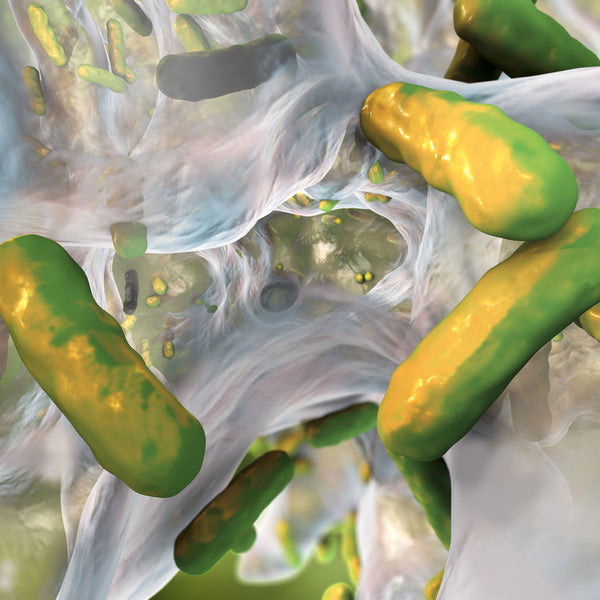
Neprinol Enzymes for Biofilms
Invader overgrowth can also spread to the bloodstream, where this problem is known to cause potential blood or urinary tract issues [2]. The main reason that invaders (e.g., bacteria, fungi, viruses) can have such a strong impact on health is linked to their ability to form biofilms — a thick, protective layer (shield) that forms around invaders and offers defense against conventional interventions [1-3]. Neprinol® is a dietary supplement formulated with scientifically supported enzymes that help to target the components that make up their protective outer layer.
Powerful Enzymes Disrupt Invader Shield (Biofilm) Formation

The outer layer or shield that helps harmful microorganisms grow forms in a highly organized manner that invaders adopted over time to enhance their survival [3, 4]. The formation process is so organized that contamination of food packaging or medical device surfaces can also create an environment for invader shield (biofilm) formation. This can lead to potential short-term or long-term health problems for people who come in contact with such items [1].
Furthermore, if this protective layer contains multiple species, the problem becomes even more difficult to address. Invaders that thrive due to protective shield (biofilm) formation have also demonstrated up to 1,000 times higher treatment resistance than foreign microorganisms without similar protection [3]. Fortunately, several powerful enzymes in Neprinol® target various components of the protective outer layer.
The sticky layer is bound together by different particles that allow invaders to bind to the lining of the gut, urinary tract, or blood vessels where they typically cause health to gradually deteriorate. More specifically, the protective shield consists of polysaccharides (carbohydrates), lipids (fats), proteins, and other particles [5].
Although the body’s immune system works quickly to target invaders, regular supplementation with research-based enzymes supports the body's natural defenses by targeting their outer layer [1, 2].
- Lipase — Breaks down lipids (fats)
- Nattokinase, and Protease — Degrade different types of proteins
- Serrapeptase — Degrades both proteins and polysaccharides

Together, these enzymes destroy structures necessary for forming the thick, sticky layer that often makes harmful agents resistant to our natural immune responses. However, targeting their shield disrupts rapid growth, and supplementation with powerful enzymes is one of the keys to sustained health. Healthcare professionals even emphasize the high importance of enzyme supplementation for the degradation of proteins, carbohydrates, and fats in the protective layer of invader shields [1, 4, 6].
Neprinol® offers powerful enzymatic potency that specifically targets the particles invaders need to form their protective outer layer. Exposure to common invaders cannot always be avoided, but taking Neprinol® regularly provides an added weapon to your arsenal to help support the body's natural defenses.
- Jee SC, Kim M, et al. Efficient Biofilms Eradication by Enzymatic-Cocktail of Pancreatic Protease Type-I and Bacterial α-Amylase. Polymers (Basel). 2020;12(12):3032.
- Pinto H, Simoes M, Borges A. Prevalence and Impact of Biofilms on Bloodstream and Urinary Tract Infections: A Systematic Review and Meta-Analysis. Antibiotics (Basel). 2021;10(7):825.
- Penesyan A., Gillings M., Paulsen I.T. Antibiotic discovery: Combatting bacterial resistance in cells and in biofilm communities. Molecules. 2015;20:5286–5298.
- Wolfmeier H., Pletzer D., Mansour S.C., Hancock R.E.W. New Perspectives in Biofilm Eradication. ACS Infect. Dis. 2018;4:93-106.
- Flemming H.C., Wingender J. The biofilm matrix. Nat. Rev. Microbiol. 2010;8:623-633.
- Lim E.S., Koo O.K., Kim M., Kim J. Bio-enzymes for inhibition and elimination of Escherichia coli O157: H7 biofilm and their synergistic effect with sodium hypochlorite. Sci. Rep. 2019;9:9920.